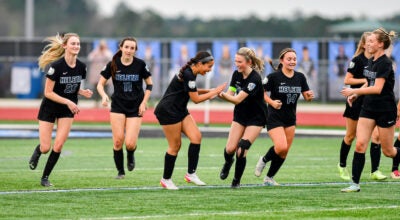Injured military participate in Adaptive Aquatics
Published 5:15 pm Tuesday, August 11, 2009
Ryan Soto was returning from his final mission in his 15th month in Afghanistan when his vehicle was attacked by enemy rocket-propelled grenades.
The third generation Airborne Infantryman, who suffered shrapnel wounds to his face, legs and arms, was shot twice in the chest and once in the head after exiting the vehicle before being evacuated June 20, 2008.
Fast forward 415 days. Soto sat on a dock at Shelby County’s Lay Lake sunbathing Saturday.
“I’ve actually got some sun and some color to me now,” Soto said.
Soto was one of 16 severely injured military servicemen who took part in Adaptive Aquatics on Lay Lake as part of the Lima Foxtrot’s Operation Alpha, a program for severely injured military ran by Birmingham’s Lakeshore Foundation.
The 16 servicemen traveled to Lay Lake for a full day of water sports, fishing, kayaking, paddling, pontoon boat rides, swimming and water skiing.
Soto, a native of McIntosh, Minn., has spent the past five months at Brooke Army Medical Center in San Antonio. His daily routine is centered around hospital care and rehabilitation clinics.
Soto, who said his favorite part of Adaptive Aquatics was being able to water ski, said spending a day on a lake in Alabama in 90-degree heat is a nice break from his daily activities.
“It’s been very relaxing having a chance to just unwind from being in a hospital,” Soto said. “It’s been hot, but it’s been nice.”
Adaptive Aquatics, which is a year round adapted waterskiing facility for children and adults with disabilities, is run by Wilsonville natives Joe and Rhonda Ray. Joe, the non-profit organization’s executive director, said he works with severely injured military servicemen and women approximately five weekends a year.
Joe’s wife Rhonda, who does volunteer work with the organization, said the Adaptive Aquatics facility has hosted injured servicemen and women for the past four years.
“Being in the civilian sector, I think it’s really important for all Americans to thank (service men and women) for their service,” Rhonda said. “To see what they can do despite their injuries is rewarding.”
Mandy Goff, coordinator of the Lakeshore Lima Foxtrot program, said Operation Alpha participants come from all ages, all branches of the military and all over the United States. Most of the injured servicemen sustained traumatic brain injuries in the Iraq and Afghanistan conflicts, Goff said. Goff said TBI is a new type of injury seen in the latest conflicts.
“It’s an injury you can’t necessarily see,” Goff said. “There has been a high prevelance of TBI. The after effects are a lot different from other types of injuries.”
Goff, who said each participant brought one guest with them to Adaptive Aquatics, said the day at Lay Lake will hopefully provide encouragement for the injured servicemen.
“It is a life-changing experience,” Goff said. “This is the first time many of them have been around other warriors not in a hospital. For some it is the first time to recreate with family members since their injury. We hope they’ll take what they’ve learned here and apply it in every day life.”
Soto has received a lot of attention during his recovery. He is the subject of a film by Justin Springer, a Tulane University film graduate who served in the Army.
Springer received Army approval to film inside Brooke Army Medical Center. Springer is following Soto and three other injured servicemen as they are treated for TBI.
Soto doesn’t mind the extra attention.
“It’s been pretty cool having (Justin) follow me around,” Soto said.
Operation Alpha was made possible by Hill Crest Foundation, Inc. which funded 100 percent of the event. For more information about Operation Alpha, visit lakeshore.org. For more information about Adaptive Aquatics, visit adaptiveaquatics.org.









